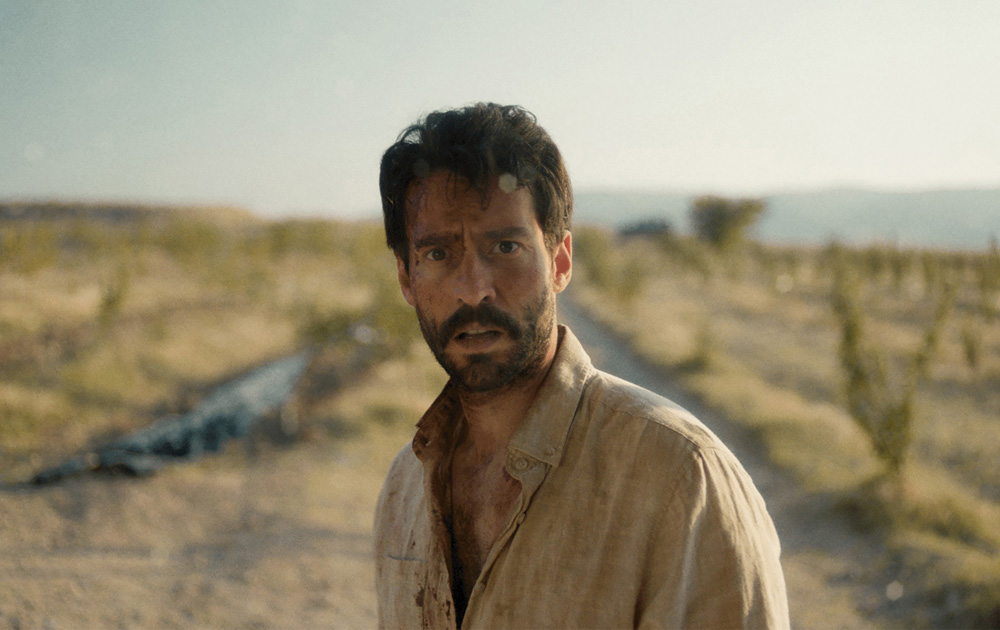“No one’s resentful by nature,” Reza (Erkan Kolçak Köstendil), a drifter that’s wandered onto the property of Ali (Ekin Koç) in “The Things You Kill,” to calm down the owner whose dog is barking incessantly as he approaches after being assured himself that it’s not him, but the dog that needs to tone it down. Reza seems to know more than Ali about a few things, impressing him with his knowledge of irrigation when looking over the latter’s garden where dry dirt overwhelms any plant life and though Ali doesn’t want to hire a gardener, he finds himself offering up a fridge, a bed and 3500 lira to the stranger who appears as if he can do the things he cannot, an arrangement that goes well beyond horticulture in Alireza Khatami’s provocative third feature.
It isn’t the shoddy arrangement of the pipes that’s preventing growth in “The Things You Kill,” which may feature a prominent dedication up front to Khatami’s sisters, but it is less charitably dedicated to men and the trauma they pass on from one generation to the next. For those familiar with Khatami, it may not be quite as surprising that “The Things You Kill” dabbles in metaphysics when in the director’s previous films “Oblivion Verses” and “Terrestrial Verses” (with co-director Ali Asgari) if bad things happen, the earth can literally start to shake and it is good to be forewarned when the film is so slyly surreal, it occasionally requires the viewer to catch up. However, the writer/director continues to sharpen his ability to make it feel as if what’s going on in the mind of characters tortured by adhering to a particular line of thought, whether encouraged by a society or simply within their own family, can manifest itself into actual poisonous environment around them, delivering a gut punch on multiple levels.
You don’t immediately see Ali’s father Hamit (Ercan Kesal), but you’re aware of him as soon as “The Things You Kill” begins, as Ali’s wife Hazar (Hazar Ergüçlü) recalls a dream she had with the night before with her husband over coffee in which his dad made a strange appearance. He clearly haunts Ali on a more regular basis, making him think twice about ever visiting his ailing mother Sakine and largely keeping his distance due to his father’s abusive behavior in the past. He has the wherewithal to do so when he pursued an education abroad and has returned to his native Turkey as a university professor, but when Sakine dies unexpectedly – and suspiciously – taking a fall, Ali and Hamit are forced back into the same room together, even if they can’t make it through five minutes without recriminations flying.
Ali would want to believe he’s moved as far away as possible from following in his father’s footsteps in his ultra-modern home and intellectual work debating the proper translation of Turkish expressions into English, but there are small giveaways that at least part of his influence unconsciously remains from the unsparing, embarrassing rebuke of a student who pulls her cell phone out in class to hiding the fact that he has a low sperm count from his wife as the two spend years trying to get pregnant, allowing her to think that she may be to blame herself. As he becomes more consumed with anger regarding his mother’s death, Ali threatens to become the man he grew up hating, ultimately employing Reza in unimaginable ways as his worst self emerges and Khatami is able to vividly externalize the toxicity that’s built up inside someone that has so strenuously avoided repeating history that there’s damage of denying that part of themselves at all.
The handoff from the first half of the film to the second is intended to blindside, which it does effectively, yet to shock requires a certain level of patience on the part of the viewer as the “Jekyll and Dr. Hyde”-esque conceit requires some adjusting to in its immediate aftermath. The rewards are there when not only does Ali have to face a reckoning with the fact he could ever fully escape the influence of the person that raised him, but Khatami explores other consequences of a full embrace of patriarchal beliefs, leading to such intriguing ideas of how a feeling of impunity compels Ali to being more forthright, for better or worse. Although the director isn’t shy about working in metaphor, the implications of “The Things You Kill” are bracingly direct.
“The Things You Kill” will screen again at Sundance on January 25th at 9:40 am at the Megaplex Redstone 2, January 26th at 6:45 pm at the Broadway Centre Cinemas in Salt Lake City, January 30th at 12:45 pm at the Holiday Village Cinemas and February 2nd at 4:40 pm at the Megaplex Redstone. It will also be available online via the Sundance platform from January 30th through February 2nd.




